Chainlink has emerged as a cornerstone in the Web3 ecosystem, offering decentralized oracle services that bridge blockchain technology with real-world data, making smart contracts more versatile and reliable. The LINK token plays a crucial role in this network, serving as the payment medium for oracle services and incentivizing node operators to maintain the system's integrity.
This piece aims to explore the best chainlink wallets for securely managing LINK tokens, comparing various options based on features, security, and user suitability to help you decide on the ideal wallet for your needs.
What is Chainlink?
Chainlink is a decentralized Oracle network that bridges blockchain technology with off-chain and real-world data. Smart contracts on various blockchains use Chainlink to securely interact with external data feeds, APIs, and traditional bank payments.
As a critical infrastructure for Web3 and the broader cryptocurrency industry, Chainlink ensures that blockchain-based systems can access accurate and reliable off-chain data, mitigating the inherent limitations of blockchain's deterministic nature.
 Chainlink data request model | Image via Docs
Chainlink data request model | Image via DocsFor instance, while blockchains like Ethereum can track token balances, they cannot independently determine the current price of a token — this is where Chainlink's Decentralized Oracle Network (DON) comes into play, providing tamper-resistant and reliable data to blockchain applications.
LINK Token
The LINK token is the native cryptocurrency of the Chainlink network, serving multiple purposes within the ecosystem. LINK primarily pays for data services provided by Chainlink oracles, incentivizing node operators to provide accurate and reliable data.
LINK is integral to Chainlink's staking mechanism, where token holders can stake LINK to participate in the network's security and governance.
History and Milestones
Chainlink was founded in 2014 by Sergey Nazarov and Steve Ellis under SmartContract, to solve the "oracle problem"—the challenge of securely bringing off-chain data onto the blockchain. The Chainlink network went live on Ethereum in May 2019, initially supporting a single ETH/USD price feed. Over the years, Chainlink has introduced numerous products and expanded its reach across various blockchain networks.
Notable milestones in Chainlink's recent development since 2023 include:
- July 2023: Chainlink's Cross-Chain Interoperability Protocol (CCIP) launched on the mainnet across Avalanche, Ethereum, Optimism, and Polygon, offering secure and efficient cross-chain communication for decentralized finance (DeFi) and other applications. By May 2024, CCIP had expanded to support nine networks.
- October 2023: The launch of Data Streams on the Arbitrum mainnet marked a significant advancement in Chainlink's data services, providing early access to DeFi protocols and enhancing data delivery efficiency.
- January 2024: Uma, in collaboration with Flashbot, introduced the Oracle Value Aggregation Layer (Oval) on the Ethereum mainnet. Oval is a groundbreaking mechanism for capturing MEV (Maximal Extractable Value), enabling protocols to monetize the value generated through the consumption of Chainlink Oracle data.
- April 2024: Chainlink unveiled Transporter, a cross-chain bridging application powered by CCIP. Transporter allows users to seamlessly bridge assets like ETH, USDC, and LINK across eight supported networks, further enhancing the interoperability and utility of Chainlink within the broader crypto ecosystem.
- May 2024: Chainlink's "Functions" product entered beta on Arbitrum, Avalanche, Polygon, Ethereum, and Base, offering developers a powerful tool for integrating off-chain computations with smart contracts. Additionally, the release of Chainlink VRF 2.5 on April 29, 2024, demonstrated the ongoing evolution of Chainlink's Verifiable Random Function (VRF) services, enhancing security and scalability.
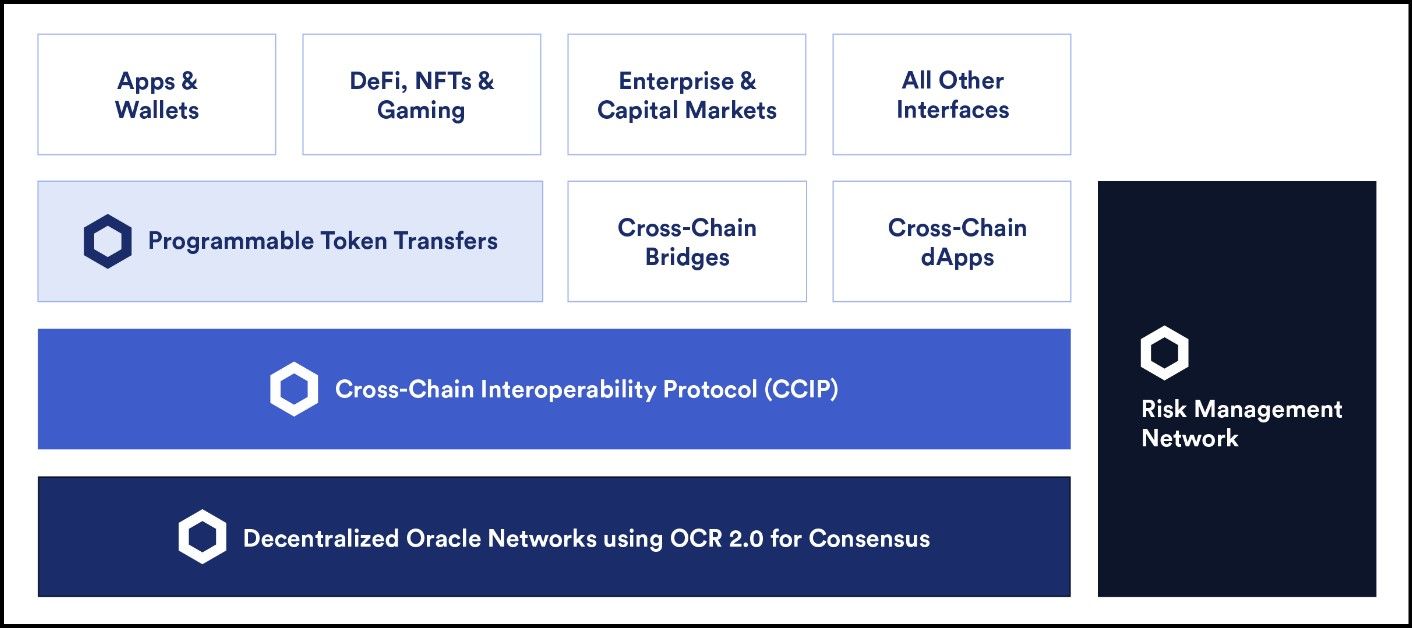 CCIP Tech Stack | Image via Chainlink Docs
CCIP Tech Stack | Image via Chainlink DocsThese milestones underscore Chainlink's continuous innovation and expansion, reinforcing its position as the leading decentralized Oracle network in Web3.
If you wish to dig deeper into the concepts, check out our full Chainlink review.
Best Chainlink Wallets
If you want to hold LINK tokens as an investment strategy or participate in the Chainlink ecosystem by staking, here is a list of wallets you can consider.
| Wallet | Key Features | Security | Ideal For |
|---|---|---|---|
| MetaMask | - Supports DApp integration, token swaps, and multi-chain access - Available as browser extension and mobile app | - Private key encryption - Hardware wallet integration - Two-factor authentication (2FA) | Users seeking an easy-to-use software wallet with extensive DApp support and multi-chain capabilities |
| Ledger Wallets | - Cold storage with secure element (SE chip) - Ledger Live for asset management and LINK staking - Bluetooth connectivity (Nano X) | - Cold storage with 24-word recovery phrase - Optional Ledger Recover service | Individuals prioritizing maximum security and prefer a hardware wallet solution |
| Exodus Wallet | - User-friendly across desktop, mobile, and browser - Built-in token swaps and staking options | - Encrypted private keys - Backup phrases - Lacks two-factor authentication and multisig | Users looking for an accessible software wallet with asset support and Trezor integration for added security |
| WalletConnect | - Extensive DApp integration with over 6,000 apps - Multi-chain support and LINK staking | - End-to-end encryption - User approval for every transaction - No third-party private key management | Users seeking a decentralized way to connect wallets to a wide range of DApps across multiple chains |
| Coinbase Wallet | - Easy-to-use interface - Supports Ethereum, Bitcoin, Solana, and all ERC-20 tokens - Integration with Coinbase ecosystem | - Biometric authentication - Two-factor authentication (2FA) - Offline storage options | Users valuing ease of use, especially within the Coinbase ecosystem, and those needing robust security measures |
| Rabby Wallet | - Automatic multi-chain switching for DeFi DApps - Open-source - Hardware wallet support | - Pre-transaction risk scanning - Transaction simulations - Alerts for vulnerabilities | DeFi users looking for a MetaMask alternative with enhanced security features and multi-chain capabilities |
Metamask
MetaMask, launched in 2016 by ConsenSys, is one of the most widely used Ethereum-based wallets, offering browser extensions and mobile app versions. It makes it easy to store, manage, and trade a wide variety of ERC-20 tokens, including LINK. MetaMask's ease of use, powerful features, and strong community make it a preferred choice for interacting with Web3.
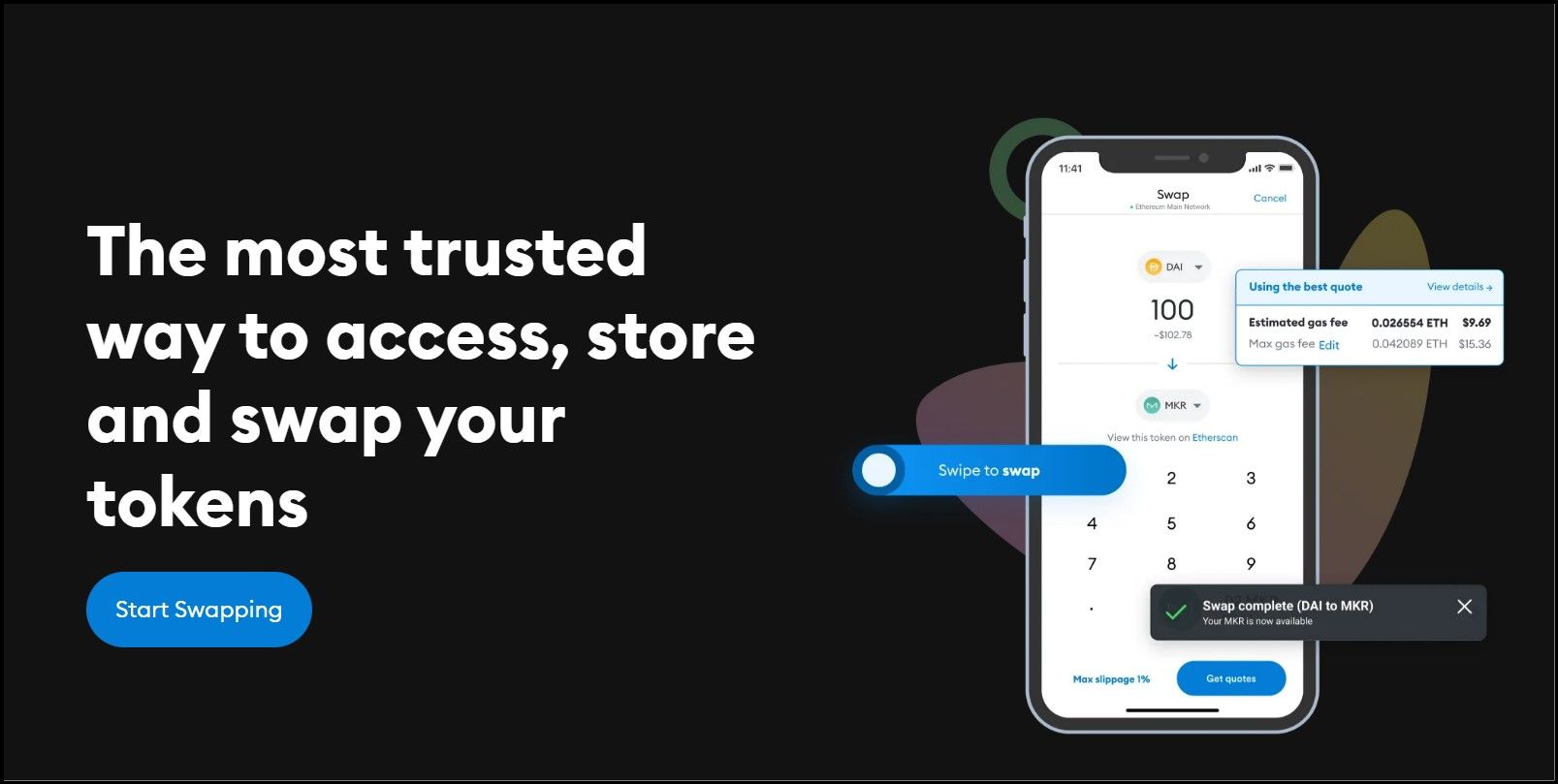 Metamask is the Most Widely Used Wallet | Image via Metamask
Metamask is the Most Widely Used Wallet | Image via MetamaskSecurity
- MetaMask is a self-custodial wallet, meaning users have complete control over their private keys. Key security features include:
- Private Key Encryption: Ensures private keys are stored securely on your device.
- Hardware Wallet Integration: Compatible with Ledger and Trezor for enhanced security.
- Two-Factor Authentication (2FA): Adds an extra layer of security to protect against unauthorized access.
- Seed Phrase Recovery: A 12-word recovery phrase that users can use to restore their wallet on a new device.
Features
MetaMask is packed with features that make it versatile and powerful for a variety of tasks:
- DApp Integration: Seamlessly connect to popular DApps like Uniswap, Curve, and other DeFi protocols with just a few clicks.
- Multi-Chain Support: Supports Ethereum and other EVM-compatible blockchains such as Polygon. It also extends support outside Ethereum with Snaps.
- In-App Token Swaps: Easily swap tokens directly within the wallet, with access to decentralized exchanges.
- Staking Options: Participate in LINK staking.
- Portfolio DApp: A multi-chain portfolio management tool that tracks assets across different blockchains in one place.
User Experience
MetaMask offers an intuitive user interface that appeals to beginners and seasoned crypto users. The mobile app and browser extension provide a consistent and clean interface, making it easy to navigate through features like buying crypto, swapping tokens, and interacting with DApps. The platform's flexibility in managing multiple accounts and networks adds to its user-friendliness.
Community and Support
MetaMask has a vibrant community of users and developers, contributing to its ongoing development and providing extensive resources for new users. The wallet's open-source nature encourages community-driven innovation, ensuring continuous improvement.
Ledger Wallets
Ledger is a leading name in the hardware wallet industry, renowned for providing robust and secure solutions for storing cryptocurrencies offline. The Ledger Nano S Plus and Nano X are its flagship products, offering a balance of security and functionality, while the newer Ledger Stax and Ledger Flex introduce interactive features with their touchscreens, catering to users seeking a more dynamic experience.
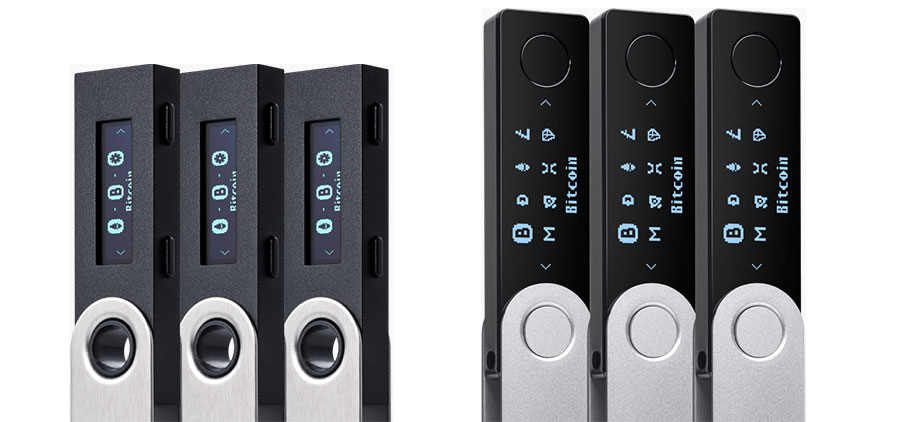 Ledger Nano S & Nano X. Image via Ledger
Ledger Nano S & Nano X. Image via LedgerKey Features of Ledger Wallets
- Enhanced Security
- Cold Storage: Ledger wallets are built around cold storage, meaning your private keys are stored offline, significantly reducing the risk of hacking.
- Secure Transactions: The devices are equipped with tamper-resistant Secure Element (SE) chips, ensuring that your assets remain protected.
- Compatibility and Connectivity
- Ledger Live Support for LINK: Ledger Live, the companion software for Ledger devices, supports over 5,500 cryptocurrencies, including LINK. This application allows users to manage their assets, view transaction history, and stake coins directly from their desktop or mobile device.
- USB and Bluetooth Compatible: The Ledger Nano X and Flex offer Bluetooth connectivity, enabling users to manage their crypto on the go with a mobile app, while the Nano S Plus connects via USB-C, providing secure transactions on desktop and Android devices.
- Seed Phrase Recovery: All Ledger devices use a 24-word recovery phrase to ensure users can restore their wallet on a new device if needed. The Ledger Recover service is an optional backup solution that securely splits and stores your seed phrase across multiple locations for added peace of mind.
- Chainlink Staking Support: Following the launch of Chainlink Staking v0.2, Ledger wallets now support staking LINK tokens directly through the Ledger Live app, allowing users to earn rewards while maintaining the security of their assets.
- User-Friendly Interface: Setting up a Ledger device is straightforward, with clear instructions provided during the initial setup. Whether using the Nano S Plus or the more advanced Stax, Ledger ensures that users of all experience levels can easily configure and manage their wallets.
Exodus Wallet
Exodus is a well-regarded software wallet that provides users with an intuitive platform for managing a wide range of cryptocurrencies, including Chainlink (LINK). Available on desktop, mobile, and as a browser extension, Exodus is known for its user-friendly design and comprehensive features, making it a popular choice among new and experienced crypto users.
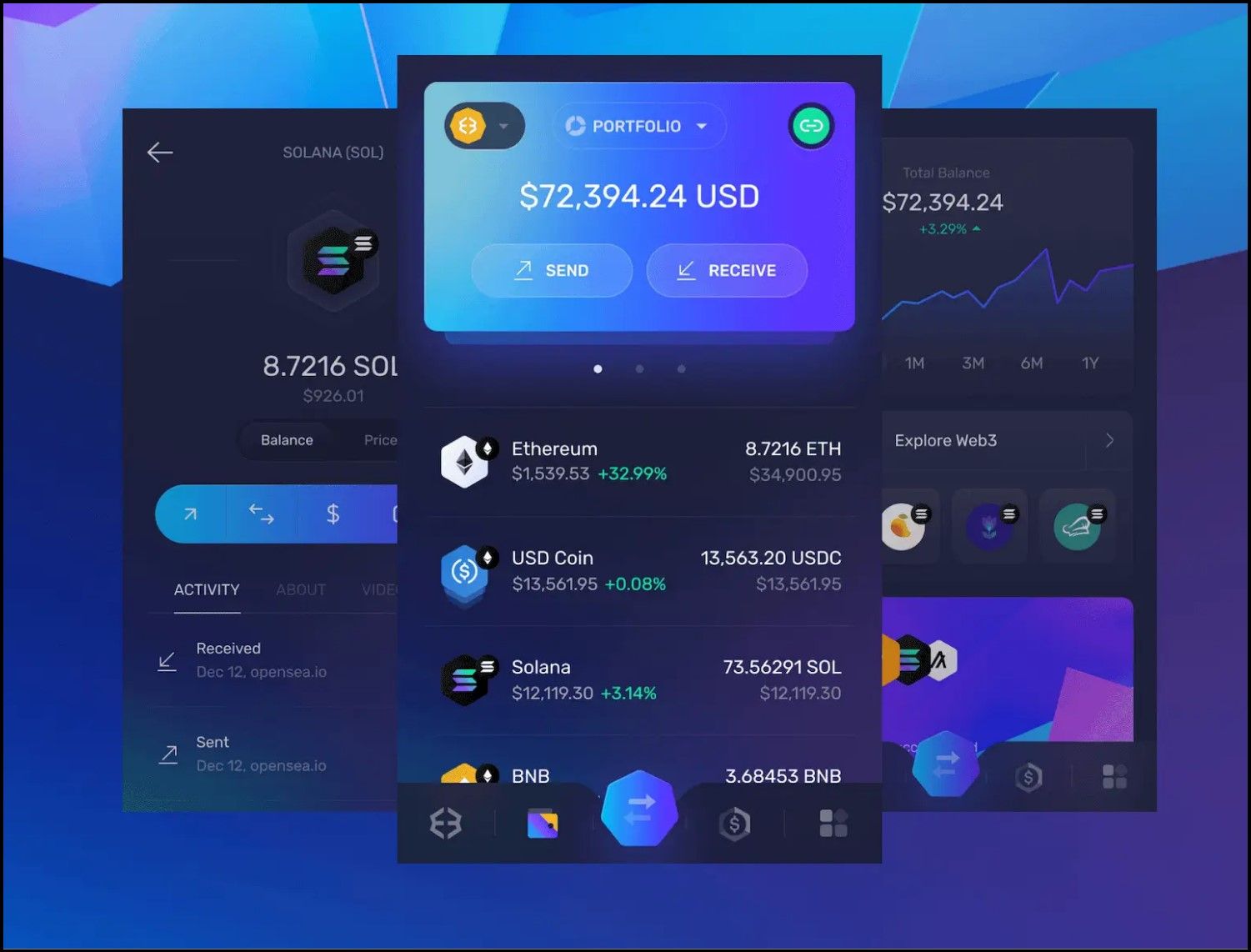 Exodus is a Versatile Crypto Wallet | Image via Exodus
Exodus is a Versatile Crypto Wallet | Image via ExodusKey Features of Exodus Wallet
- Security
- Encrypted Private Keys: Exodus securely stores your private keys on your device, ensuring you can access your funds only. The keys are encrypted, adding an extra layer of security.
- Password Protection: Users can set up a strong password to protect their wallet, though this feature needs to be manually enabled.
- Backup and Recovery: Exodus provides a 12, 18, or 24-word backup phrase, essential for recovering your wallet if you lose access to your device. However, it lacks advanced security features like two-factor authentication and multi-signature support, which are available in other wallets.
- Features
- DApp Integration: Exodus connects to DApps via its Web3 wallet. Users can interact with popular DApps like Uniswap, OpenSea, and Compound, enhancing their DeFi experience. The Web3 Wallet also supports auto-connect and auto-approve features, simplifying interactions with DApps.
- In-Built Token Swaps: Users can swap between cryptocurrencies directly within the Exodus wallet. Although this feature is convenient, it involves a spread markup, which might make it slightly more expensive than using a traditional exchange.
- User Experience: Exodus is designed with ease of use in mind, offering a clean and straightforward interface across all platforms. Whether you're accessing your wallet via desktop, mobile, or browser, Exodus provides a consistent and user-friendly experience.
- Community and Support
- Educational Resources: Exodus offers a robust library of educational content, helping users learn more about cryptocurrency management and security. The support team is available 24/7 to assist with any issues or questions, ensuring users can get the help they need when they need it.
The Exodus wallet is as safe as any online wallet can be. The only visible drawback to Exodus is that there is no support for staking LINK, which should be a problem only if you are planning to stake in the first place. Otherwise, the Exodus wallet is another solid option for the Chainlink network. Check out the Exodus Wallet review to know more.
WalletConnect
WalletConnect is a pioneering open-source protocol that enables seamless and secure connections between cryptocurrency wallets and DApps across multiple blockchain networks. Launched to improve user interaction within the decentralized ecosystem, WalletConnect has become a familiar name since its inception.
Key milestones include the launch of WalletConnect v2.0, which introduced enhanced features like multi-chain support, and the development of APIs such as WalletConnect Sign and WalletConnect Auth, further simplifying the user experience. The protocol stands out for its commitment to privacy, security, and broad compatibility across platforms and devices.
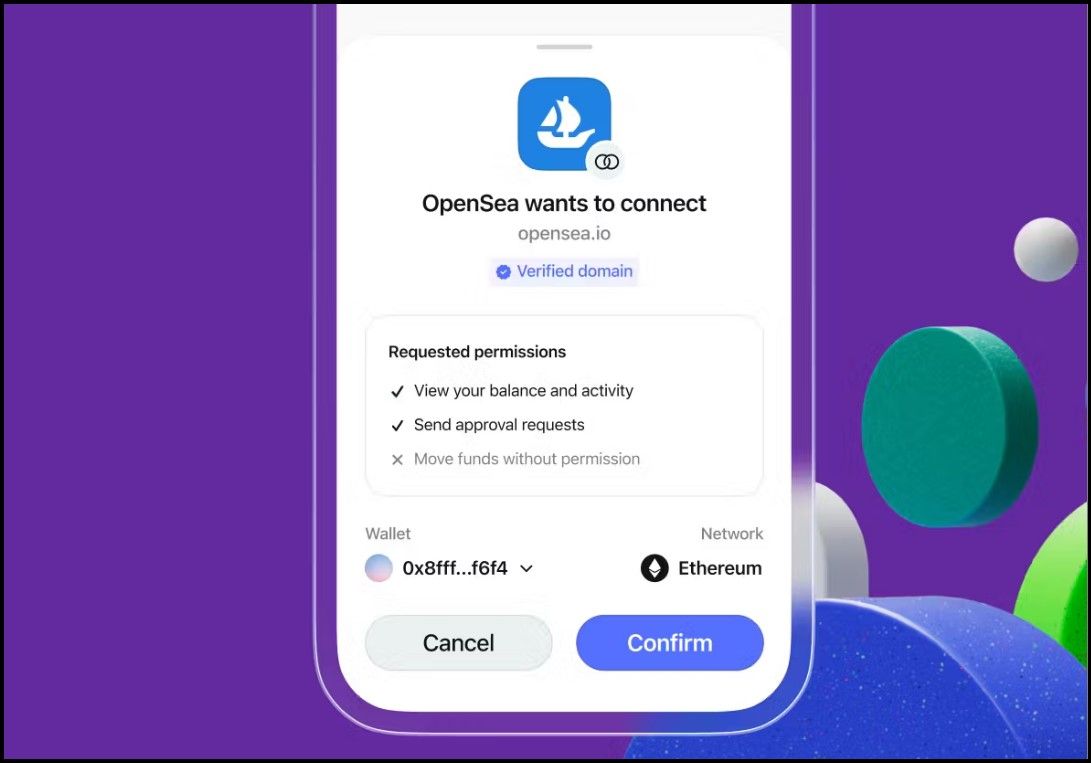 WalletConnect has Solid DApp Integration | Image via WalletConnect
WalletConnect has Solid DApp Integration | Image via WalletConnectKey Features
- DApp Integration: WalletConnect provides robust DApp integration, allowing users to connect their wallets to over 6,000 DApps across 150+ chains. This integration supports many use cases, including DeFi activities, NFTs, and more, making it a versatile tool for the Ethereum ecosystem.
- Token Support: WalletConnect supports the seamless interaction of various tokens within Dapps, including Ethereum and ERC-20 tokens. Its interoperability allows users to manage and transact with tokens across different blockchain networks, not just Ethereum.
- LINK Token Staking Support: WalletConnect also supports LINK token staking. This feature is particularly beneficial for those involved in DeFi, as it allows for direct interaction with staking protocols.
- Device Support: WalletConnect is designed to be platform-agnostic, supporting connections across iOS, Android, and desktop environments. This cross-platform compatibility ensures users can access their wallets and DApps from any device, enhancing the overall user experience.
Security
WalletConnect emphasizes security through several key measures:
- End-to-end Encryption: Communication between the wallet and DApps is secured using end-to-end encryption, ensuring that sensitive data remains confidential and is not exposed during transactions.
- User Approval Process: Every connection and transaction requires manual approval by the user, adding a layer of security by preventing unauthorized actions.
- No Third-Party Involvement: WalletConnect eliminates the need for third-party intermediaries, reducing the risk of data breaches or unauthorized access.
User Experience
WalletConnect is designed to be user-friendly, focusing on simplifying the interaction between wallets and DApps. The protocol allows users to connect their wallets to DApps by scanning a QR code, making the process intuitive and efficient. The cross-platform support further enhances accessibility, allowing users to engage with the Ethereum ecosystem from any device.
Community and Customer Support
WalletConnect has cultivated a strong community around its protocol, with active support channels and comprehensive documentation available for users and developers. The community-driven development approach ensures that WalletConnect remains responsive to user needs and continues to evolve in alignment with industry trends. Additionally, the WalletConnect team provides real-time support and updates through their website and social media channels, helping users troubleshoot issues and stay informed about the latest developments.
Coinbase Wallet
Coinbase Wallet is a mobile wallet application. It is a secure and user-friendly alternative to token storage and is especially ideal for Coinbase exchange users. The wallet supports the Ethereum network and ERC-20 tokens, some prominent layer-2s, and some layer-1s like Solana.
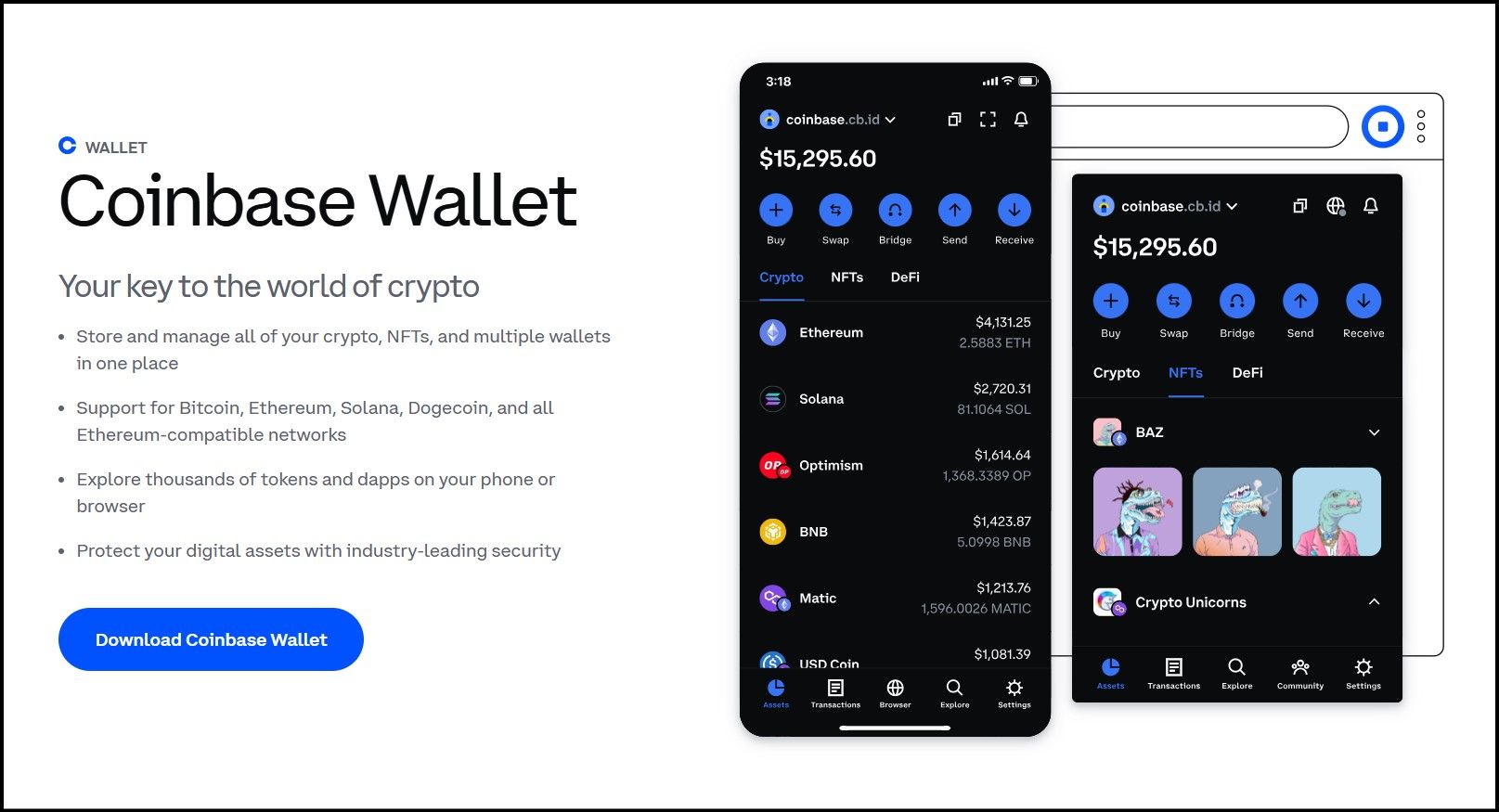 Coinbase Wallet is a Non-Custodial Wallet | Image via Coinbase
Coinbase Wallet is a Non-Custodial Wallet | Image via CoinbaseThe wallet allows full private key custody and operates separately from the Coinbase exchange. The key features of Coinbase Wallet are:
- User-Friendly Interface: Coinbase Wallet offers an intuitive interface on mobile and browsers, catering to beginners and experienced users alike.
- Multi-Currency Support: The wallet supports a wide array of cryptocurrencies, including Ethereum, Bitcoin, Solana, and all ERC-20 tokens, as well as NFTs.
- Decentralized Custody: Users have complete control over their private keys, ensuring secure and decentralized asset management.
- Extensive DApp Integration: Seamlessly connects with numerous DApps within the Ethereum and Solana ecosystems for DeFi and NFT activities.
- Coinbase Ecosystem Integration: Allows for easy transfers between the wallet and Coinbase exchange, enhancing user convenience, especially in regions where Coinbase operates.
Security Features
- Advanced Security Options: Features biometric authentication, 2FA, and secure seed phrase backups for enhanced security.
- Offline Storage of Private Keys: Integrates with Ledger hardware wallets for offline storage, reducing online security risks.
- Insurance Coverage: Assets held on the Coinbase exchange are insured, offering additional protection.
- Frequent Audits and Upgrades: Benefits from regular security audits and updates as part of the Coinbase ecosystem.
Rabby Wallet
Rabby Wallet, developed by DeBank, is a self-custodial, multi-chain software wallet designed for DeFi users. Launched as a secure alternative to MetaMask, Rabby stands out for its automatic chain-switching capability and robust security features, making it ideal for multi-chain scenarios. The wallet supports Ethereum and all ERC-20 tokens, including Chainlink staking, and is available as a free Chrome browser extension and desktop application.
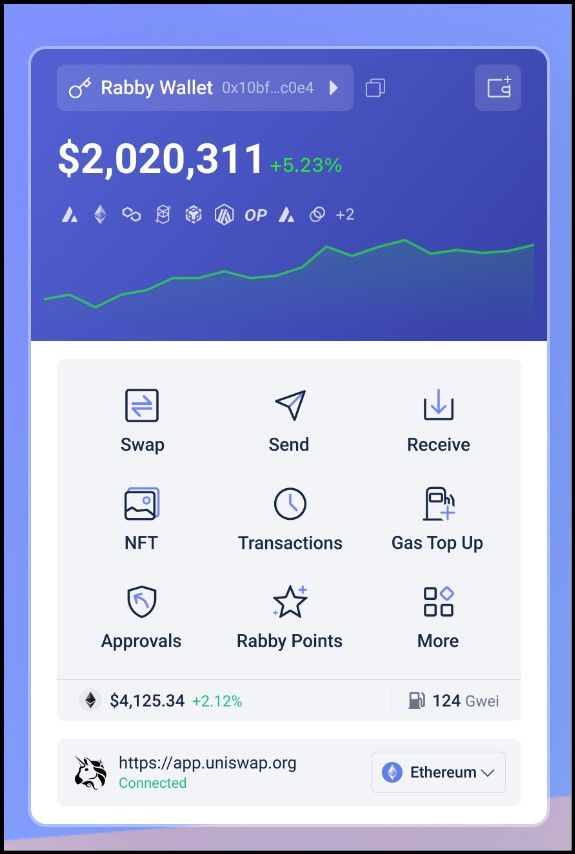 Rabby is a Metamask Alternative | Image via Rabby
Rabby is a Metamask Alternative | Image via RabbyKey Features:
- Multi-Chain Support: Rabby Wallet is designed to automatically select the correct blockchain when you visit a DeFi app, providing a seamless user experience and enhancing usability.
- Self-Custody and Security: Rabby Wallet ensures users have complete control over their assets. Private keys are stored locally on the user's device and are exportable anytime, independent of Rabby's back-end services. Professional security firms audited the wallet's open-source software, further bolstering user confidence.
- Advanced Transaction Security: Rabby includes a pre-transaction risk scanning feature that alerts users to potential risks, such as interactions with compromised smart contracts or unrecognized recipient addresses. This proactive security measure helps prevent fraudulent transactions before execution.
- DApp Integration: Rabby supports extensive DApp integration within the Ethereum ecosystem, allowing users to engage in various DeFi activities directly through the wallet. It also supports Chainlink staking, providing additional utility for DeFi enthusiasts.
- Multiple Signing Methods: The wallet supports a wide range of signing methods, including integration with hardware wallets like Ledger and Trezor, as well as mobile wallets compatible with WalletConnect. This flexibility ensures users can securely manage their assets using their preferred method.
Security Features
- Transaction Screening: Every transaction is sent through a security engine that screens for potential vulnerabilities, and users are alerted if any risks are detected. This feature is crucial in safeguarding against malicious smart contracts and other security threats.
- Open-Source and Audited: Rabby's code is open-source, and the wallet has undergone security audits by reputable firms, which adds a layer of transparency and trust for users.
Best Chainlink Wallets: Analysis
Let's summarize what we have discussed so far:
MetaMask
- Features: Supports seamless DApp integration, token swaps, and multi-chain access through a browser extension and mobile app.
- Security: Offers private key encryption, integration with hardware wallets, and two-factor authentication (2FA).
- Ideal For: Users seeking an easy-to-use software wallet with extensive DApp support and multi-chain capabilities.
Ledger Wallets
- Features: Provides cold storage, Ledger Live for asset management, and Bluetooth connectivity in advanced models like Nano X.
- Security: Utilizes secure elements (SE chips) and a 24-word recovery phrase, with additional support for Ledger Recover.
- Ideal For: Individuals prioritizing maximum digital asset security and prefer a hardware wallet solution.
Exodus Wallet
- Features: Offers a user-friendly interface across desktop, mobile, and browser, with built-in token swaps and staking options.
- Security: Encrypted private keys and backup phrases, but lacks advanced features like two-factor authentication and multisig.
- Ideal For: Crypto users looking for an accessible, all-in-one software wallet with extensive asset support and integration with Trezor for added security.
WalletConnect
- Features: Extensive DApp integration with over 6,000 apps, multi-chain support, and token compatibility across various blockchain networks.
- Security: Employs end-to-end encryption, user approval for every transaction, and no third-party involvement in private key management.
- Ideal For: Users seeking a secure, decentralized way to connect wallets to a broad range of DApps across multiple chains.
Coinbase Wallet
- Features: Easy-to-use interface, multi-currency support including Ethereum, Bitcoin, and Solana, and seamless integration with the Coinbase ecosystem.
- Security: Offers biometric authentication, 2FA, offline storage options, and frequent security audits.
- Ideal For: Users who value ease of use, especially those already within the Coinbase ecosystem, and those needing robust security measures.
Rabby Wallet
- Features: Automatic multi-chain switching for DeFi DApps, open-source code, and support for hardware and institutional wallets.
- Security: Pre-transaction risk scanning, transaction simulations, and security alerts for potential vulnerabilities.
- Ideal For: DeFi users looking for a MetaMask alternative with enhanced security features and multi-chain capabilities.
Where to Buy the LINK Token
To buy LINK tokens, you have several options across both centralized and decentralized platforms.
Centralized Exchanges (CEXs): LINK is widely available on major centralized exchanges like Blofin, Bybit, Binance and OKX. These platforms offer user-friendly interfaces, fiat-to-crypto conversions, and high liquidity, making purchasing LINK with fiat currency convenient. Once purchased, you can store your LINK in the exchange's wallet or transfer it to a personal wallet for added security.
Decentralized Exchanges (DEXs): For those preferring a more decentralized approach, LINK can also be purchased on decentralized exchanges like Uniswap, SushiSwap, and 1inch. These platforms allow you to trade directly from your wallet using Ethereum or other ERC-20 tokens without needing an account or KYC, providing a more private and direct way to acquire LINK. However, ensure you have ETH in your wallet to cover transaction fees.
Best Chainlink Wallets: Closing Thoughts
Selecting the right wallet for managing your LINK tokens is crucial for ensuring security and ease of use. Whether you prioritize the extensive DApp integration of MetaMask, the top-tier security of Ledger hardware wallets, or the user-friendly interface of Exodus, each option offers unique strengths tailored to different user needs.
By carefully considering your priorities, you can choose the wallet that best aligns with your goals in the ever-evolving Web3 landscape.





